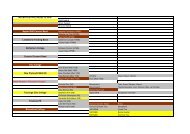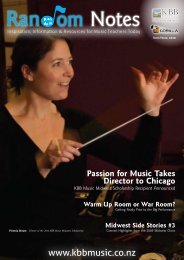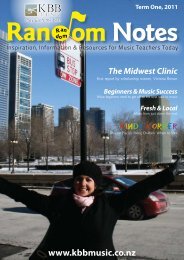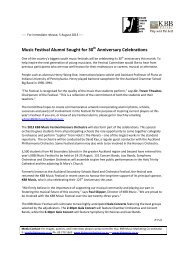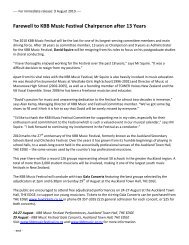choral briefs midwest clinic performance anxiety - KBB Music
choral briefs midwest clinic performance anxiety - KBB Music
choral briefs midwest clinic performance anxiety - KBB Music
Create successful ePaper yourself
Turn your PDF publications into a flip-book with our unique Google optimized e-Paper software.
For the <strong>choral</strong> director, this means doing a little research.<br />
Find out about the poet or lyricist. Examine the context<br />
of the text: when it was written, what for, who for? If it’s an<br />
excerpt from an opera, oratorio, cantata or musical, what<br />
is the dramatic context of the song at that point in the<br />
work as a whole? If the work is in a foreign language, ask<br />
a proficient speaker to give you a direct translation – and<br />
to explain the poetry and how a native speaker might<br />
read more into the text than a non-native speaker would.<br />
Don’t rely on a paraphrase – these are usually inaccurate<br />
(especially the sung paraphrase written in the <strong>choral</strong><br />
arrangements, which are not word-for-word and therefore<br />
do not follow the natural text shape of the melodic line).<br />
Once your students are singing the work, ask them often<br />
what each word or phrase means. Each singer will have<br />
their own idea about the meaning, and many of these will<br />
be valid. Draw on their ideas and come to a shared vision<br />
of the work. It will make things so much more meaningful<br />
for the choir as a whole.<br />
At the 2009 NZCF Sing Aotearoa Festival in Rotorua,<br />
former King’s Singers member Simon Carrington gave a<br />
seminar entitled Tasting the Text – the Missing Ingredient.<br />
This mixing of the senses and allusion to a recipe for<br />
<strong>choral</strong> technique is very useful in this context. He describes<br />
singers as having the “unique privilege of singing<br />
words,” and says that choirs must focus not just on the<br />
mechanics of vocal technique, but also on the "organs of<br />
communication: the mouth, lips, tip of the tongue, eyes.”<br />
The end result of all this work to reflect the text? An<br />
effective and convincing <strong>performance</strong> that transports<br />
the audience to another time or place. Anyone who saw<br />
the King’s Singers on their recent tour to New Zealand<br />
will have seen evidence of this. Nothing is ever ‘half<br />
done’. Each piece is spellbinding. On the other hand, I<br />
have heard several professional-level choirs where the<br />
standard of singing is top-notch, the intonation flawless,<br />
the gradation of dynamics impeccable… but there is still<br />
something absent – passion, emotion, believability. All<br />
these come from the text.<br />
If you want somewhere to start, think about our own<br />
national anthem. Say the first two lines as if it was a<br />
poem, rather than a song. Now think about the word<br />
stress, elision at the ends of lines, the meaning. Once I<br />
had done this, I realised that I could never sing it again<br />
without a comma after “nations”, and with a breath<br />
after “feet” – despite the impression that 99% of the<br />
population sings it like that. If you really think about it,<br />
the meaning is almost reversed when sung that way! •<br />
David Squire is music director of the New Zealand Youth Choir and<br />
several secondary school choirs, orchestras and bands in Auckland.<br />
Formerly a HOD music, he is now a freelance itinerant teacher<br />
based at Westlake Girls & Boys High Schools, Long Bay College<br />
and Kristin School. A conducting mentor for the New Zealand<br />
Choral Federation Association of Choral Directors, he is available<br />
for choir workshops and conductor training.<br />
Contact him at schoirltd@gmail.com, or check out his website:<br />
www.davidsquire.co.nz<br />
David Squire directing the NZ Youth Choir. Photo: Tony Speakman



